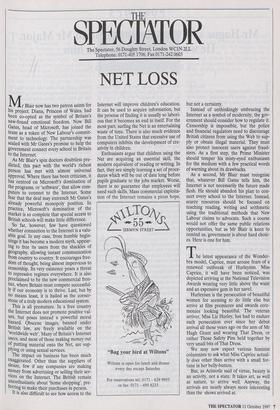SPECTAT THE OR The Spectator, 56 Doughty Street, London WC1N 2LL
Telephone: 0171-405 1706; Fax 0171-242 0603
NET LOSS
Mr Blair now has two patron saints for his project. Diana, Princess of Wales, had been co-opted as the symbol of Britain's new-found emotional freedom. Now Bill Gates, head of Microsoft, has joined the team as a token of New Labour's commit- ment to technology. The partnership was sealed with Mr Gates's promise to help the government connect every school in Britain to the Internet.
As Mr Blair's spin doctors doubtless pre- dicted, this pact with the world's richest person has met with almost universal approval. Where there has been criticism, it has centred on Microsoft's domination of the programs, or 'software', that allow com- puters to connect to the Internet. Some fear that the deal may entrench Mr Gates's already powerful monopoly position. In Practice, Microsoft's domination of the market is so complete that special access to British schools will make little difference.
So far, however, few have questioned whether connection to the Internet is a valu- able goal. In any case, from humble begin- nings it has become a modern myth, appear- ing to free its users from the shackles of geography, allowing instant communication from country to country. It encourages free- dom of thought, being almost impervious to censorship. Its very existence poses a threat to repressive regimes everywhere. It is also Proclaimed to be the new commercial fron- tier, where Britain must compete successful- ly if our economy is to thrive. Last, but by no means least, it is hailed as the corner- stone of a truly modern educational system. This is all premature. In a free country the Internet does not promote positive val- ues, but poses instead a powerful moral hazard. Obscene images, banned under British law, are freely available on the worldwide web'. Many of Britain's Internet users, and most of those making money out of putting material onto the Net, are sup- plying or using sexual services. The impact on business has been much exaggerated. Other than the suppliers of sleaze, few if any companies are making money from advertising or selling their ser- vices on the Internet. The British remain unenthusiastic about 'home shopping', pre- ferring to make their purchases in person. It is also difficult to see how access to the Internet will improve children's education. It can be used to acquire information, but the process of finding it is usually so labori- ous that it becomes an end in itself. For the most part, surfing the Net is an entertaining waste of time. There is also much evidence from the United States that excessive use of computers inhibits the development of cre- ativity in children.
Enthusiasts argue that children using the Net are acquiring an essential skill, the modern equivalent of reading or writing. In fact, they are simply learning a set of proce- dures which will be out of date long before pupils graduate to the jobs market. Worse, there is no guarantee that employees will need such skills. Mass commercial exploita- tion of the Internet remains a pious hope, but not a certainty.
Instead of unthinkingly embracing the Internet as a symbol of modernity, the gov- ernment should consider how to regulate it. Censorship is impossible, but the police and financial regulators need to discourage British citizens from using the Web to sup- ply or obtain illegal material. They must also protect innocent users against fraud- sters. As a first step, the Prime Minister should temper his misty-eyed enthusiasm for the medium with a few practical words of warning about its drawbacks.
As a second, Mr Blair must recognise that, whatever Bill Gates tells him, the Internet is not necessarily the future made flesh. He should abandon his plan to con- nect every school to the Internet. Instead, scarce resources should be focused on teaching reading, writing and arithmetic using the traditional methods that New Labour claims to advocate. Such a course would not offer the same public relations opportunities, but as Mr Blair is keen to remind us, government is about hard choic- es. Here is one for him.
The latest appearance of the Wonder- bra model, Caprice, must arouse fears of a renewed outbreak of Hurleyism. Miss Caprice, it will have been noticed, was depicted arriving at the National Television Awards wearing very little above the waist and an expensive gem in her navel.
Hurleyism is the persecution of beautiful women for seeming to do little else but arrive at film premieres and awards cere- monies looking beautiful. The veteran arriver, Miss Liz Hurley, has had to endure such persecution ever since her debut arrival all those years ago on the arm of Mr Hugh Grant and wearing That Dress, or rather Those Safety Pins held together by very small bits of That Dress.
We may now expect various feminist columnists to ask what Miss Caprice actual- ly does other than arrive with a small for- tune in her belly-button.
But, as Aristotle said of virtue, beauty is an activity, not a state. It takes art, as well as nature, to arrive well. Anyway, the arrivals are nearly always more interesting than the shows arrived at.


















































































 Previous page
Previous page